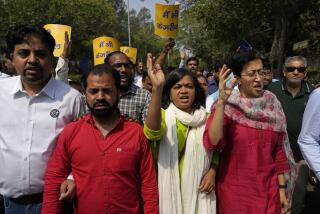India snubs U.S. delegation, withdraws security over diplomat’s arrest
NEW DELHI -- India reacted Tuesday to the arrest of one of its diplomats in New York last week by snubbing a U.S. Congressional delegation, removing security from outside the U.S. Embassy and threatening to treat U.S. diplomats the same way it says its envoys were treated by America.
The issue has become a major story, with India’s often-breathless media calling the situation a “full blown diplomatic war,” while National Security Adviser Shivshankar Menon was quoted describing the U.S. action as “barbaric” and “despicable.”
The incident was sparked off when Devyani Khobragade, India’s deputy consul general, was arrested last week by New York police on charges of visa fraud. Indian media reports say she was handcuffed, strip-searched at a New York police station and put in a lockup with common criminals and drug addicts.
A State Department spokeswoman in Washington said Monday that standard procedures were followed in Khobragade’s arrest. The U.S. Embassy in New Delhi had no immediate comment.
Khobragade, 39, is accused by U.S. prosecutors of submitting a false visa application for her female housekeeper, promising to pay her $9.75 an hour when, in fact, she was paid about $3 an hour. On Thursday, Khobragade pleaded not guilty to visa fraud in Manhattan Federal Court and was released on $250,000 bail. Her lawyer argued that she was entitled to diplomatic immunity.
Indian media reported Tuesday that India has retaliated by summoning U.S. Ambassador Nancy Powell and withdrawing all airport passes for U.S. consulate and embassy vehicles, effectively removing their priority treatment and free parking.
It has also asked the U.S to provide information on the salaries paid to all Indian staff employed at U.S. missions in India and those working as domestic help for American families.
It has removed security from around the U.S. Embassy in the leafy Chanakyapuri district of New Delhi. India has also reportedly asked for the visa and bank account details of all teachers working at U.S. schools in the country to determine whether they’re paying tax or not.
And on Tuesday, several senior government ministers and top politicians -- including Narendra Modi, the prime ministerial candidate for the opposition Bharatiya Janata Party, and Rahul Gandhi, the scion of the Nehru-Gandhi family leading India’s ruling Congress Party -- refused to meet a visiting Congressional delegation.
Members of the delegation included representatives George Holding (R-N.C.), Pete Olson (R-Texas), David Schweikert (R- Ariz.), Robert Woodall (R-Ga.) and Madeleine Bordallo (D-Guam).
The kerfuffle comes in advance of a general election expected early next year. Analysts said India’s government, which has presided over several massive scandals and a weak economy, is wary of being accused of lacking patriotism or going soft on foreign policy.
“We are shocked and appalled at the manner in which she has been humiliated by the U.S. authorities,” said Syed Akabaruddin, foreign ministry spokesman, at a briefing Friday. “We are also reiterating, in no uncertain terms, to the U.S. Embassy here that this kind of treatment to one of our diplomats is absolutely unacceptable.”
Analysts said the incident underscored anti-American sentiment that is sometimes just below the surface.
“I haven’t been able to understand how people in New York behaved the way they did,” said K. Shankar Bajpai, an analyst with the Delhi Policy Group think tank and a former Indian ambassador to the U.S. “It doesn’t take much to arouse anti-Americanism. It’ll obviously leave a bad taste.”
Bajpai said some of this is a carry-over from colonialism, with the U.S. inheriting some of the mixed views Indians felt toward Britain, which ruled the country for over a century. A more vibrant, deregulated Indian media also magnifies relatively small events sometimes, he added.
“Our political system is bowing to real or imagined public opinion with an election popping up,” Bajpai said. “Newspapers pick up things like this, so they don’t fall behind in the ratings.”
Twitter: @MarkMagnier
Tanvi Sharma in The Times’ New Delhi bureau contributed to this report.
More to Read
Start your day right
Sign up for Essential California for news, features and recommendations from the L.A. Times and beyond in your inbox six days a week.
You may occasionally receive promotional content from the Los Angeles Times.





